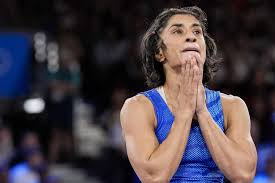
Table of Contents
The world of competitive wrestling, as demonstrated by Vinesh Phogat recent experience at the Paris Olympics 2024, is not only physically demanding but also emotionally taxing. Vinesh Phogat, a celebrated Indian wrestler, faced significant challenges during the Games, including issues related to weight management, which ultimately contributed to her disappointment. Understanding why cutting weight is such a grueling process and how the rules governing it work provides insight into the complexities faced by athletes in this sport.
The Challenges of Cutting Weight
**1. *Physiological Strain*:
Cutting weight involves significant physiological strain on the body. Wrestlers like Vinesh Phogat need to shed pounds to compete in a specific weight class, which requires extreme measures that can be taxing on both body and mind. This process often includes dehydration, caloric restriction, and intense exercise regimens. The strain can lead to dehydration, electrolyte imbalances, and fatigue, affecting performance and overall health.
**2. *Dehydration*:
One of the primary methods for cutting weight is dehydration. Wrestlers may reduce fluid intake drastically to lose water weight quickly. While this approach can be effective in meeting weight limits, it comes with risks such as reduced stamina, impaired cognitive function, and increased susceptibility to injuries. Rehydrating after weigh-in is crucial but can be challenging if the weight loss has been extreme.
**3. *Caloric Restriction*:
Reducing caloric intake is another common method for weight management. Athletes follow strict diets that are often low in calories but high in nutrients to maintain energy levels. This restriction can lead to fatigue, decreased muscle mass, and mood swings, which affect both training and competition performance.
**4. *Intense Exercise*:
To complement dietary restrictions and dehydration, wrestlers engage in rigorous exercise routines designed to maximize weight loss. These routines can include high-intensity interval training, long cardio sessions, and sweat-inducing activities like sauna use. The physical toll of such training can lead to exhaustion and increased risk of injuries.
How the Rules Work
**1. *Weight Classes*:
Wrestling competitions are organized into weight classes to ensure fair competition among athletes of similar body weights. Each class has a specific weight limit, and competitors must weigh in at or below this limit to participate. Weight classes vary by wrestling style and competition level, but all are designed to create a level playing field.
**2. *Weigh-In Procedures*:
Typically, wrestlers are required to weigh in on the day before or the morning of their bout. This process is strictly monitored, and athletes must meet the weight limit to be eligible for competition. Some tournaments have additional weigh-ins during the event to ensure that athletes maintain their weight throughout the competition.
**3. *Hydration and Rehydration*:
After the official weigh-in, athletes often engage in rehydration and refueling processes. They consume fluids and food to restore energy levels and recover from the weight-cutting process. However, the extent to which they can rehydrate and replenish depends on the time available before their match and the extent of their previous weight loss.
**4. *Weight Management Rules*:
Regulations regarding weight management are put in place to prevent extreme weight-cutting practices that could endanger athletes’ health. These rules often include guidelines on the maximum allowable weight loss over a specific period and monitoring of hydration levels. Violations of these rules can result in penalties, including disqualification or forfeiture of matches.
The Psychological and Emotional Impact
**1. *Mental Stress*:
The pressure to meet weight limits and the physical strain of cutting weight can lead to significant mental stress. Wrestlers like Phogat face the challenge of balancing their physical health with their competitive goals. The stress of weight management can affect focus, motivation, and overall mental well-being.
**2. *Emotional Toll*:
The emotional toll of weight cutting can be profound. Athletes may experience feelings of frustration, disappointment, and anxiety related to their weight and performance. For Phogat, who faced disqualification due to weight issues, the emotional impact is compounded by the loss of a significant opportunity and the public scrutiny that follows.
**3. *Impact on Performance*:
Weight cutting can affect performance, as athletes may enter the competition with depleted energy levels and compromised physical health. The balance between maintaining weight and ensuring peak performance is delicate, and mismanagement can lead to suboptimal performance or even injuries.
Vinesh Phogat’s Experience
Vinesh Phogat’s experience at the Paris Olympics 2024 highlights the challenges of cutting weight and the complexities of competitive wrestling. Despite her hard work and dedication, Phogat faced significant hurdles related to weight management, which contributed to her heartbreak during the Games.
**1. *Efforts and Sacrifices*:
Phogat’s efforts to cut weight involved rigorous training, strict dieting, and hydration management. Her commitment to these practices underscores the dedication required to compete at the highest level. However, the challenges of weight management can sometimes outweigh the benefits, as seen in her recent experience.
**2. *Disqualification*:
The disqualification of Vinesh Phogat, partly related to weight issues, serves as a poignant reminder of the difficulties inherent in managing weight in competitive sports. It reflects the high stakes and pressures faced by athletes and the impact that weight-related issues can have on their careers.
**3. *Future Considerations*:
Looking ahead, Vinesh Phogat and her team will likely reassess their approach to weight management and competition preparation. The experience will provide valuable insights for future events, allowing her to refine her strategies and address any challenges more effectively.
Conclusion
The heartbreak experienced by Vinesh Phogat at the Paris Olympics 2024 underscores the complex and demanding nature of weight management in competitive wrestling. Cutting weight involves significant physiological, psychological, and emotional challenges, as athletes like Vinesh Phogat strive to meet stringent requirements while maintaining peak performance. Understanding the intricacies of weight management rules and the impact on athletes provides a deeper appreciation for the sacrifices and pressures faced by those competing at the highest levels. As Vinesh Phogat and others in the sport navigate these challenges, their experiences highlight the resilience and determination required to excel in the world of competitive wrestling.







